|
|
|
Sort Order |
|
|
|
Items / Page
|
|
|
|
|
|
|
| Srl | Item |
| 1 |
ID:
091282
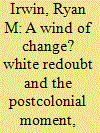

|
|
|
|
|
| Publication |
2009.
|
| Summary/Abstract |
In July 1963, U.S. Secretary of State Dean Rusk held a private meeting with Dr. Willem Naude, the ambassador from South Africa. "A rough time [is] ahead," Rusk explained as the representative sat down in his office. "We are under enormous pressure but do not intend to give in." Several members of the so-called African bloc at the United Nations had successfully protested the practice of apartheid-South Africa's system of institutionalized racial discrimination-in the Security Council that year, and pressure was rapidly mounting in the General Assembly for mandatory economic sanctions against South Africa. The ambassador looked across Rusk's desk and noted that it was "ironical" that ten years earlier they had been allies in the Cold War, and now his country was being isolated in its struggle against a "common enemy." He went on to assert, "The United States [is] to a large degree responsible for releasing these revolutionary forces in the world. The goal of a great power should be to play down tensions and try to get people to talk together, but the United States without even opening its mouth [has] released dangerous forces in the world." Rusk paused for a moment before responding, "[I wonder] if these forces [are] not deeply rooted in the nature of man. [I wonder] if this discourse has not been going on for 2,000 years. Did not man, like most animals, not like to be pushed around too much?"
|
|
|
|
|
|
|
|
|
|
|
|
|
|
|
|
| 2 |
ID:
080306
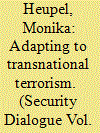

|
|
|
|
|
| Publication |
2007.
|
| Summary/Abstract |
During the 1990s, and particularly since 9/11, state-sponsored terrorism gradually declined, while transnational terrorism, which largely operates without direct state support and features cross-border network structures and a greater propensity to mass-casualty attacks, has gained in importance. Setting out from this observation, the purpose of this article is to examine whether the UN Security Council (SC) has adapted to transnational terrorism and, if so, how. Providing a systematic and theory-guided comparison of the SC's approach to these different types of terrorism, the article shows that, contrary to common considerations, the SC did adapt to transnational terrorism. The SC applied sanctions against terrorists and committed every state to instituting far-reaching generic counter-terrorism measures. Moreover, in an unprecedented way, it made use of managerial compliance strategies to foster implementation. In this way, the SC adapted to transnational terrorism by demanding more from states and intervening deeper into their domestic realm, while at the same time offering more support with respect to implementation. While such an approach is unlikely to become common SC practice in the short term, it is nevertheless symptomatic of a broader trend in the evolution of governance patterns in the post-national constellation today
|
|
|
|
|
|
|
|
|
|
|
|
|
|
|
|
| 3 |
ID:
052136
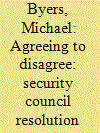

|
|
|
|
|
| Publication |
Apr-Jun 2004.
|
|
|
|
|
|
|
|
|
|
|
|
|
|
|
|
| 4 |
ID:
062430
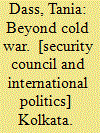

|
|
|
|
|
| Publication |
Kolkata, Minerva Associates Publications, 2004.
|
| Description |
ix, 223p.
|
| Standard Number |
8177150140
|
|
|
|
|
|
|
|
|
|
|
|
Copies: C:1/I:0,R:0,Q:0
Circulation
| Accession# | Call# | Current Location | Status | Policy | Location |
| 049744 | 341.2323/DAS 049744 | Main | On Shelf | General | |
|
|
|
|
| 5 |
ID:
184641
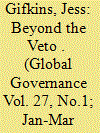

|
|
|
|
|
| Summary/Abstract |
The formal rules governing the UN Security Council offer little insight into how negotiations are conducted on a day-to-day basis. While it is generally assumed that permanent members dominate negotiations, this article investigates avenues for influence for elected members and the UN Secretariat. Institutional power is used to show how permanent members adopt dominant positions in negotiations extending far beyond their Charter-given privileges. Dominance of permanent members is moderated, however, by the legitimacy that support from elected members brings to a resolution. Similarly, the UN Secretariat can use its legitimated authority to influence decisions. The article argues that informal practices are key in understanding how power and influence are allocated in the Council and it forms a building block for future analyses of Security Council practices. This argument also has implications for the perennial reform debates and the prospects for informal reform.
|
|
|
|
|
|
|
|
|
|
|
|
|
|
|
|
| 6 |
ID:
103090
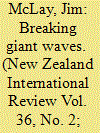

|
|
|
| 7 |
ID:
144466
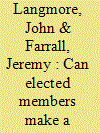

|
|
|
|
|
| Summary/Abstract |
The UN Charter gives the Security Council the extraordinary function of being responsible for international peace and security. Although the Permanent Five members are disproportionately powerful, there is nevertheless scope for elected members to influence the Council's decisionmaking processes during their short two-year terms. This article uses Australia's membership in 2013 and 2014 as a case study to examine why states seek election to the Council, means through which they can strengthen their influence, how they can navigate P5 power, how successful they are in achieving their objectives, and how the effectiveness of both elected members and the Council as a whole could be improved. Despite the substantial constraints facing elected members, those that are imaginative and industrious can nevertheless make influential contributions to achievement of the Council's purposes.
|
|
|
|
|
|
|
|
|
|
|
|
|
|
|
|
| 8 |
ID:
144960
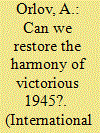

|
|
|
|
|
| Summary/Abstract |
THE 70TH ANNIVERSARY of the United Nations Organization is an international event of signal importance. Set up as a fundamental element of the international system, the UN remains its cornerstone with no alternatives no matter what its numerous critics are saying in chorus. Today amid the disarray and contradictions of the contemporary world, mankind, if confronted with the task of setting up a universal international structure to preserve peace and security, would have come up with an indifferent result if not a failure. Critics concentrate at individual aspects of the UN activity and talk about details: they stand too close to be aware of the grandiose panorama of this construction, hence their attention to arches and façades
|
|
|
|
|
|
|
|
|
|
|
|
|
|
|
|
| 9 |
ID:
154711
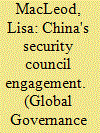

|
|
|
|
|
| Summary/Abstract |
This essay argues that UN Security Council responses to internal armed conflict are the product of the interests as well as the causal and principled beliefs of its engaged permanent members. As China has grown from a regional to a global actor, it has become a more active participant in Council deliberations. The cases of East Timor and Darfur highlight the ways in which Council decisions have come to reflect Chinese understanding of the causes of peace and conflict and appropriate peace strategies. The future of UN peace operations will depend on the ability of the Council's engaged participants to discover shared interests and points of convergence in their causal and principled beliefs.
|
|
|
|
|
|
|
|
|
|
|
|
|
|
|
|
| 10 |
ID:
138344
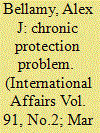

|
|
|
|
|
| Summary/Abstract |
The Democratic Peoples' Republic of Korea (DPRK) is arguably the world's most chronic abuser of human rights. In an unprecedented move, a Commission of Inquiry established by the UN's Human Rights Council accused the DPRK government of systematic violations of human rights amounting to crimes against humanity. In so doing, the Commission succeeded in putting human rights in the DPRK on the global agenda. Within months the UN's General Assembly and Security Council had joined the human rights body in examining the issue. This article explains the emergence of this new engagement with human rights in the DPRK, showing its relation to the ‘Responsibility to Protect’ principle. It charts the growing sense of frustration felt at the lack of progress on human rights in DPRK and shows how this was manifested in the General Assembly's decision to pursue the Commission's recommendations and call on the Security Council to take concrete steps. Despite this, however, the article shows that there are powerful obstacles in the way of a more robust international approach to human rights in the DPRK and counsels a less confrontational approach focused on engaging China and building trust within the Security Council.
|
|
|
|
|
|
|
|
|
|
|
|
|
|
|
|
| 11 |
ID:
108421
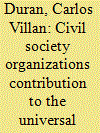

|
|
|
| 12 |
ID:
138082
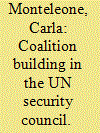

|
|
|
|
|
| Summary/Abstract |
Political coalitions in the international system are still understudied in International Relations theory. This article claims that the formation of and variations in coalitions in the international system are affected by changes in their bargaining power and bargaining environment related to the global leadership cycle and by long-term organisational changes of the international political system. Identifying the Security Council as the institution in which states are more likely to keep their systemic preferences at the institutional level, the article studies the presence, formation and change of coalitions in the international system by testing variations in the behaviour of the Security Council members in the period 1993–2012. To overcome methodological difficulties, it proposes to analyse sponsoring rather than voting behaviour. In the analysed period, the presence of a mutating dominant coalition, signs of potential coalitions in the making and an increase in participation and competition resulting from modifications in the organisational form of the international system are found.
|
|
|
|
|
|
|
|
|
|
|
|
|
|
|
|
| 13 |
ID:
064491
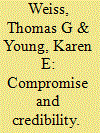

|
|
|
| 14 |
ID:
164439
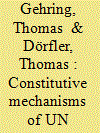

|
|
|
|
|
| Summary/Abstract |
Based upon the current debate on international practices with its focus on taken-for-granted everyday practices, we examine how Security Council practices may affect member state action and collective decisions on intrastate conflicts. We outline a concept that integrates the structuring effect of practices and their emergence from interaction among reflective actors. It promises to overcome the unresolved tension between understanding practices as a social regularity and as a fluid entity. We analyse the constitutive mechanisms of two Council practices that affect collective decisions on intrastate conflicts and elucidate how even reflective Council members become enmeshed with the constraining implications of evolving practices and their normative implications. (1) Previous Council decisions create precedent pressure and give rise to a virtually uncontested permissive Council practice that defines the purview for intervention into such conflicts. (2) A ratcheting practice forces opponents to choose between accepting steadily reinforced Council action, as occurred regarding Sudan/Darfur, and outright blockade, as in the case of Syria. We conclude that practices constitute a source of influence that is not captured by the traditional perspectives on Council activities as the consequence of geopolitical interests or of externally evolving international norms like the ‘responsibility to protect’ (R2P).
|
|
|
|
|
|
|
|
|
|
|
|
|
|
|
|
| 15 |
ID:
071595
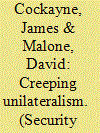

|
|
|
|
|
| Publication |
2006.
|
| Summary/Abstract |
In this article, it is argued that the genesis of the Iraq Crisis of 2003 within the Security Council can be traced to earlier patterns of acquiescence by Council members in US and UK unilateral enforcement action in Iraq. By the time this acquiescence ceased, between 1994 and 1996, UK and US enforcement policy was set and would culminate in Operation Iraqi Freedom in March 2003.
|
|
|
|
|
|
|
|
|
|
|
|
|
|
|
|
| 16 |
ID:
058023
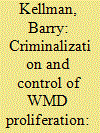

|
|
|
| 17 |
ID:
184651


|
|
|
|
|
| Summary/Abstract |
Contemporary peacekeeping operations carry out many disparate tasks, which has triggered a debate about “Christmas Tree mandates.” Did the UN Secretariat or the UN Security Council drive this expansion? Using original data on nineteen UN peacekeeping missions, 1998–2014, this article compares peacekeeping tasks recommended by the Secretariat to those mandated by the Council. It finds that the two bodies expressed different preferences regarding the nature, number, and novelty of peacekeeping tasks. First, the Council dropped Secretariat-recommended tasks as often as it added new ones on its own initiative. Second, the two bodies disagreed more over peacebuilding and peacemaking tasks than over peacekeeping tasks. Third, the Council preferred to be the one to introduce novel tasks that had not appeared in previous mandates. Finally, among the countries that “held the pen” on peacekeeping resolutions, the United States was the most prone to dropping Secretariat-proposed tasks and the least willing to add tasks itself.
|
|
|
|
|
|
|
|
|
|
|
|
|
|
|
|
| 18 |
ID:
107025
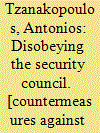

|
|
|
|
|
| Publication |
Oxford, Oxford University Press, 2011.
|
| Description |
xxxii, 243p.
|
| Series |
Oxford monographs in international law
|
| Standard Number |
9780199600762, hbk
|
|
|
|
|
|
|
|
|
|
|
|
Copies: C:1/I:0,R:0,Q:0
Circulation
| Accession# | Call# | Current Location | Status | Policy | Location |
| 056189 | 341.58/TZA 056189 | Main | On Shelf | General | |
|
|
|
|
| 19 |
ID:
125383
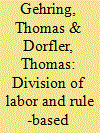

|
|
|
|
|
| Publication |
2013.
|
| Summary/Abstract |
Decisionmaking within the Security Council increasingly involves delegation to subsidiary bodies. Drawing on modern institutional theory, this article examines the effects of the emergent system of divided labor within the al-Qaeda/Taiwan sanction regime. The article first looks at the political economy of the process of listing individuals and private entities as sanctions targets. Second, it explores the distinct functions performed by the bodies of the sanctions regime; namely, the Security Council, the AQT Sanctions Committee, the Office of the Ombudsperson, and an expert body. Third, it analyzes the resulting incentive structures in three successive stage of regime development. The article concludes that the sanctions regime constitutes a surprisingly well-advanced model of how to commit even powerful states to rule based governance without depriving them of their capability to adopt political decision.
|
|
|
|
|
|
|
|
|
|
|
|
|
|
|
|
| 20 |
ID:
185161
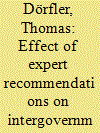

|
|
|
|
|
| Summary/Abstract |
The article explores whether and to what extent expert recommendations affect decision-making within the Security Council and its North Korea and Iran sanctions regimes. The article first develops a rationalist theoretical argument to show why making many second-stage decisions, such as determining lists of items under export restrictions, subjects Security Council members to repeating coordination situations. Expert recommendations may provide focal point solutions to coordination problems, even when interests diverge and preferences remain stable. Empirically, the article first explores whether expert recommendations affected decision-making on commodity sanctions imposed on North Korea. Council members heavily relied on recommended export trigger lists as focal points, solving a divisive conflict among great powers. Second, the article explores whether expert recommendations affected the designation of sanctions violators in the Iran sanctions regime. Council members designated individuals and entities following expert recommendations as focal points, despite conflicting interests among great powers. The article concludes that expert recommendations are an additional means of influence in Security Council decision-making and seem relevant for second-stage decision-making among great powers in other international organisations.
|
|
|
|
|
|
|
|
|
|
|
|
|
|
|
|
|
|
|
|
|